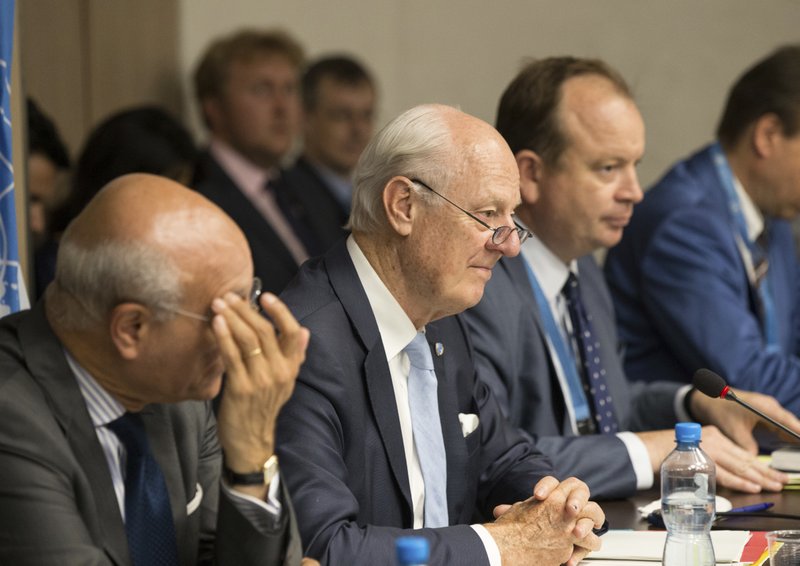GENEVA -- The seventh round of talks aimed at ending Syria's 6-year-old civil war wrapped up Friday, and a United Nations envoy said they featured "incremental progress."
Staffan de Mistura, the special U.N. envoy for Syria, said the Syrian government has not budged in its unwillingness to discuss political transition at the talks in Geneva. He said the fight against terrorism was a consistent theme for President Bashar Assad's representatives.
Saying Assad's envoys claim to be the only ones talking about the fight against terrorist groups, de Mistura said no side should have "ownership" of that issue. He went on to "clarify some thoughts" about terrorism, mostly reiterating long-standing U.N. positions that he believes have increasingly appeared dormant.
"I felt that there was an expectation for the U.N. to indicate where we are in the fight against terrorism, which is becoming the main issue being discussed at the highest possible level elsewhere," de Mistura said during a news conference, apparently referring to the focus of President Donald Trump's administration and others on combating terrorism.
[THE ISLAMIC STATE: Timeline of group’s rise, fall; details on campaign to fight it]
Syria's main opposition group has tried to put the talks' spotlight on political transition in their country, something sought by a U.N. Security Council resolution in December 2015. It has been a bedrock text underlying de Mistura's efforts.
The U.N. envoy said he has seen no sign that Assad's representatives would ever discuss political transition. "I have been asking them for the next round to be ready to address the political process," he said.
De Mistura also noted recent progress in Syria through international diplomacy, such as a temporary truce in parts of southern Syria that was brokered by Jordan, Russia and the United States.
He warmly welcomed a call by French President Emmanuel Macron for the creation of a "contact group" that would support a political road map for Syria after its war ends.
In New York, France's ambassador to the U.N., Francois Delattre, said a contact group would aim to support de Mistura's efforts. The plan would enlist the five permanent Security Council members -- the United States, Russia, China, Britain and France -- and regional players.
Delattre stressed that "the fight against terrorism is our No. 1 priority" and that the only way to get rid of terrorists "is through a negotiated political solution." He called for a "credible, robust and inclusive monitoring mechanism" for the Syrian cease-fire.
Referring to the September round of talks, de Mistura said, "We will see whether by that time the international momentum ... may be able to actually push all sides to finally sit in the same room and start talking about substance."
The sides have been meeting separately with de Mistura and his team, never speaking face to face.
The head of the Syrian government delegation, Bashar al-Ja'afari, said earlier that his team has not been asked to hold direct talks.
Alluding to foreign backers of the main Syrian opposition group, including Saudi Arabia and Turkey, as well as those who support smaller factions, Ja'afari said that "the most important thing is for us to have a national partner, and not a client for foreign agendas."
Meanwhile, clashes have broken out in northwestern Syria between two of the most powerful insurgent groups there, raising fears of widespread violence in the rebel-held province of Idlib, the groups and an opposition monitor said Saturday.
The fighting between the ultraconservative Ahrar al-Sham and the al-Qaida-linked Levant Liberation Committee are the first serious acts of violence since the sides reached a truce in February. Wider clashes between the two former allies could affect their fight against Assad's forces, who have been gaining ground over the past year under the cover of Russian airstrikes.
Idlib has taken on greater significance in Syria's civil war as opposition fighters and militants head, or are driven, there from the country's central and northern regions. Bordering Turkey, Idlib has welcomed thousands of insurgents who left the country's largest city, Aleppo, when it fell to Assad's forces in December.
Hundreds of others headed to Idlib this year from suburbs of the capital, Damascus, and the central city of Homs as part of population transfer deals with the government.
Ahrar al-Sham said in a statement Saturday that the Levant Liberation Committee is sending reinforcements to the town of Saraqeb and the Jabal al-Zawiya region in preparation for an attack. It accused the group of acts of "tyranny."
The Levant Liberation Committee's Ibaa News Agency accused Ahrar al-Sham of setting up checkpoints and detaining one of its commanders and his bodyguard, adding that the al-Qaida-linked group removed the checkpoints later by force.
Ibaa quoted a Levant Liberation Committee commander, who was identified as Mouawiyah al-Hashimi, as saying that the two groups agreed to solve the crisis in accordance with Islamic law. He added that Ahrar al-Sham issued its statement about reinforcements after the attempt to solve the dispute.
The Britain-based Syrian Observatory for Human Rights said clashes late Friday were concentrated near the village of Tel Touqan. It added that after the clashes, Ahrar al-Sham briefly cut water supplies to the capital of Idlib province, which is mostly controlled by the Levant Liberation Committee.
Information for this article was contributed by Edith M. Lederer and Bassem Mroue of The Associated Press.
A Section on 07/16/2017

